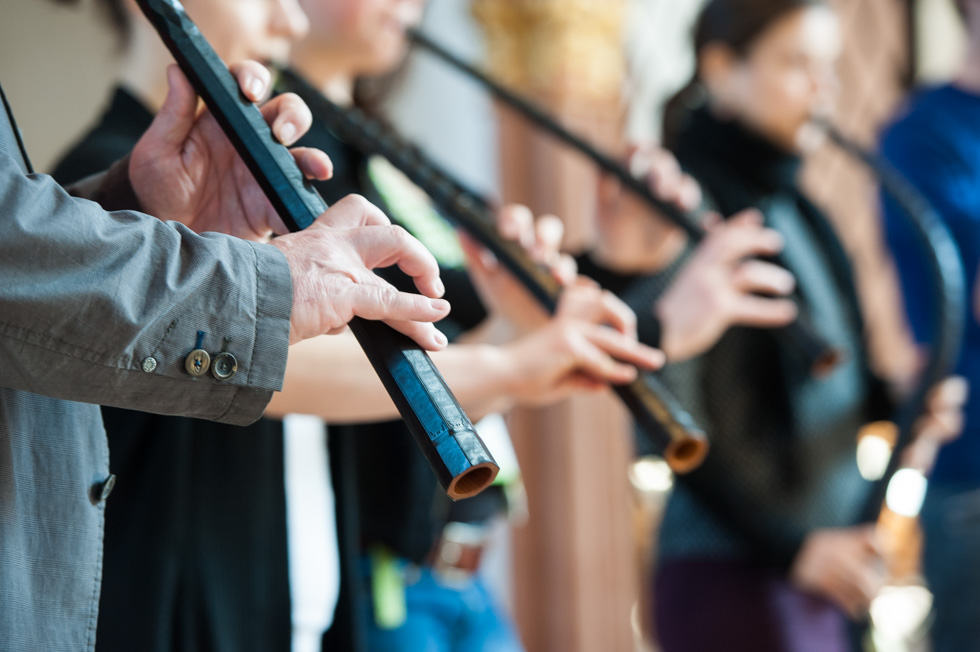BA Music | Early Music Renaissance – Romantic, instrument/voice
Hochschule für Musik Basel
A diverse and international community of lecturers and students awaits you at the Schola Cantorum Basiliensis. The bachelor’s degree programme is dedicated to a repertoire from the 16th to the end of the 19th century and its historical contexts. In the instrument/voice major, technical skills are honed and the practical and aesthetic principles of music are developed. The aim of the course is to achieve a high level of musical competence in solo and ensemble playing. The context of historical performance practice is explored through theory and complementary offerings.
.jpg)
- Basic work on playing techniques and performance practice of early music in solo and ensemble
- Knowledge of sources and notation as a basis for independent study of stylistic and aesthetic aspects of music
- Developing one’s own artistic personality and the ability to contextualise
Steckbrief
Zukunftsaussichten
Learning outcomes
The aim of this Bachelor degree programme is to develop the independent artistic personality of instrumentalists and singers with excellent musical and technical ability, both as soloists and ensemble performers. It also imparts specific knowledge of music theory and history pertinent to Early Music, which will equip students to make independent and well-founded decisions about performance practice and aesthetics. This artistic and intellectual autonomy is necessary in order to succeed in a market which is defined less by traditional institutional employers and more by an interest in the creativity and persuasiveness of individual musicians.
Career prospects
As a rule, the Bachelor degree programme prepares students for continuing their education at graduate level (Master’s). However, the experience and skills acquired during this course of study are also transferable to other professions, such as music journalism, publishing, music management and instrument making.
This particular Bachelor degree programme does not have a teacher-training component. Students wishing to pursue a career as a music educator may apply for the special Master's degree programme in Music Pedagogy upon completion of the Bachelor's studies.
Career opportunities for Renaissance-Romantic music specialists include performance work in concert, festival, Early Music concert series and church settings. As expert ensemble musicians, holders of this BA are qualified to play with existing ensembles or establish their own ensemble. A number of graduates opt to pursue a career in academic research within their chosen field of specialisation, while others choose to share their experience and expertise in workshops and masterclasses.
Target audience
This SCB Bachelor degree programme is aimed at highly talented instrumentalists and vocalists wishing to acquire an undergraduate qualification in the study and practice of music from the Early Modern, Baroque, Classical and Romantic eras. Students should be highly qualified and prepared to dedicate themselves to a course of study and training in historical performance practice that meets the highest artistic standards. Prerequisites are: talent, high level of ability (voice/instrument) as well as potential for further artistic development, experience in Early Music and an interest in the historical foundations underpinning its practice.
Aufbau und Inhalte
The Bachelor of Arts degree in Early Music offered by the Schola Cantorum Basiliensis (SCB) allows students to specialise in one of two historical periods: medieval-Renaissance or Renaissance-Romantic. The structure of both study programmes is similar but the focus of their content differs. The Renaissance-Romantic programme centres on the study of music, instruments, performance practice and repertoires from the Baroque period and adjacent eras. Students acquire a high level of practical expertise as solo and ensemble performers, while theory-based and complementary subjects provide them with a thorough grounding in historical performance practice.
This degree programme focuses on the repertoire, instruments and performance practices of the 16th to 19thcenturies. In addition to improving their mastery of period instruments and vocal techniques, students also benefit from a detailed study of repertoires and extensive exposure to historical improvisation practices. The programme also provides them with a sound understanding of the theory and history of music, which will in turn inform the development of their own musical practice. Thanks to its exceptionally talented teaching staff and students, the Baroque Department of the SCB offers an array of opportunities to gain ensemble-playing experience.
Modules and Reglements
The BA and MA degree programs at the Basel Academy of Music are based on modules.
The legally binding structure provides an initial guide to the content and weighting of the subjects on the degree program.
The detailed content and modalities of the individual subjects can be found in the module descriptions.
The study regulations come into force together with the study and examination regulations of the Basel Academy of Music FHNW and form the legal framework.
Vertiefungen
International
Leitung und Dozierende

Mitglied der Leitung, Studiengangsleitung Bachelor Renaissance-Romantik, Spez. Master historische Spielpraxis, Weiterbildung, Dozent für Lied, vokale Ensemblemusik, Cultural Entrepreneurship

Dozierende der Schola Cantorum Basiliensis
Unsere international renommierten Dozierenden auf einen Blick
Voraussetzungen, Zulassung, Eignungsabklärung
Language skills
We expect students to have good German language skills at the beginning of the studies. Students who are not German native speakers must present at least a B1 German language certificate (according to the Common European Framework of Reference for Languages (CEFR)) at the beginning of the studies.
